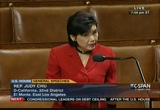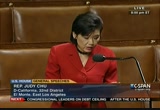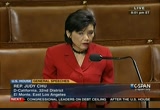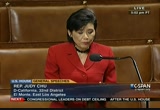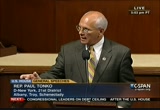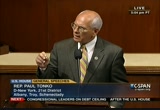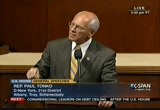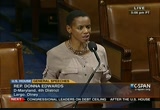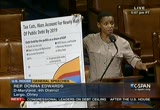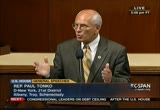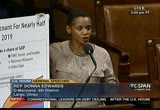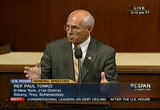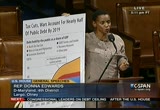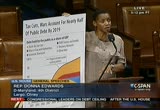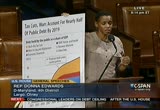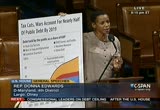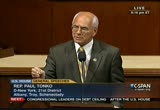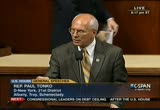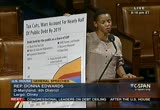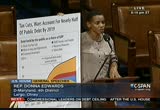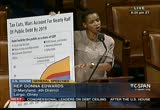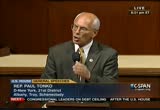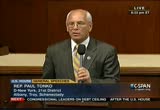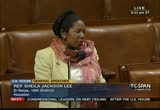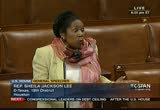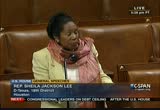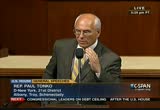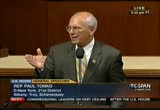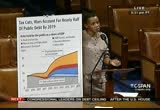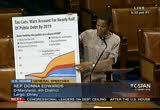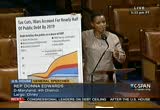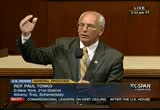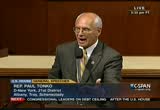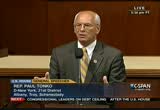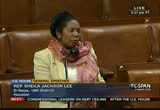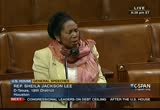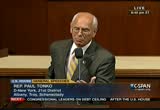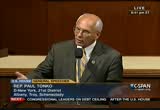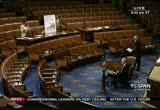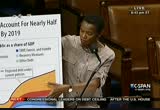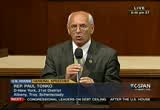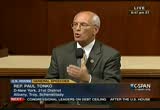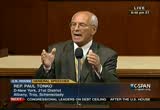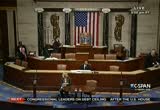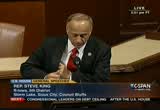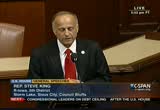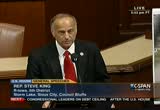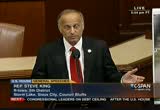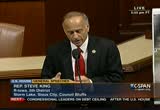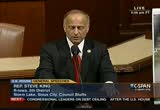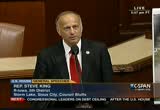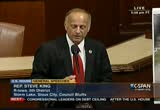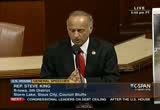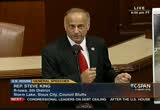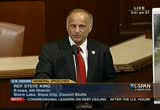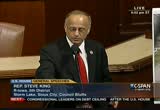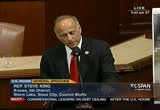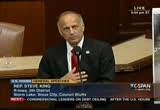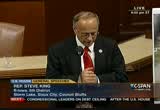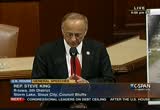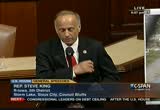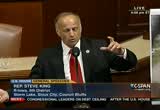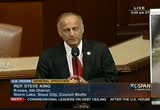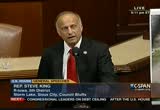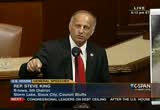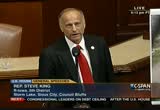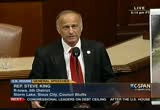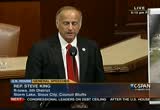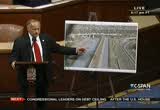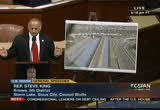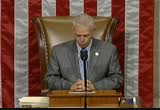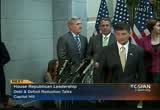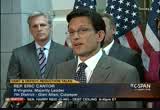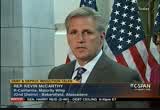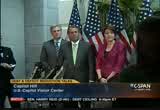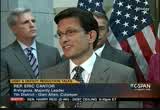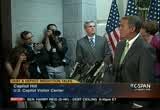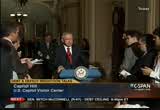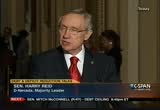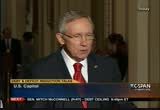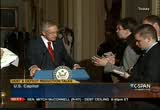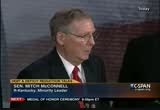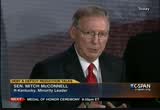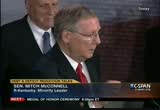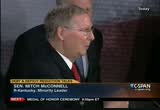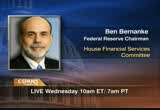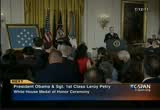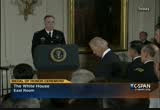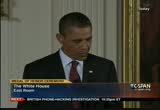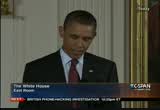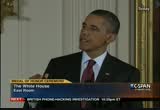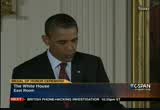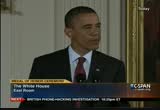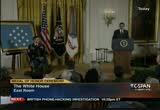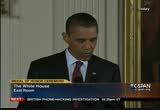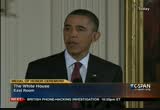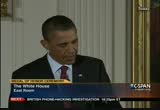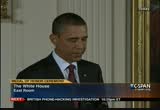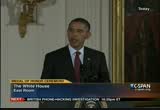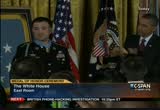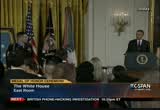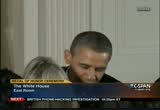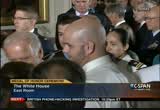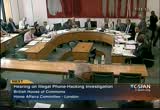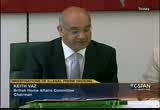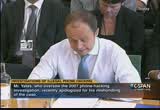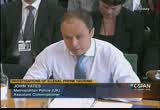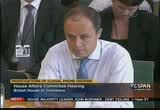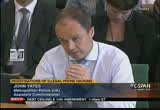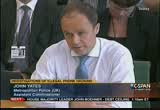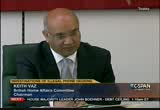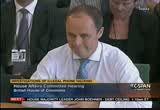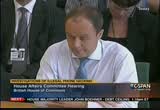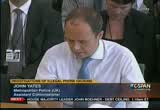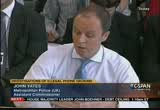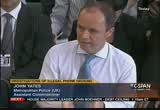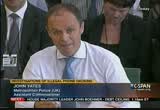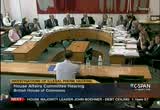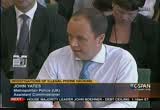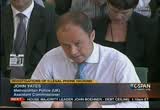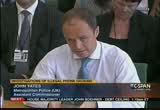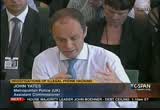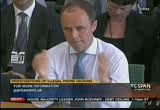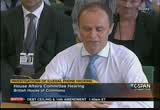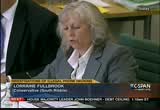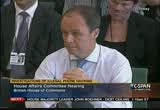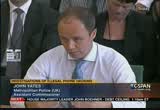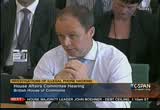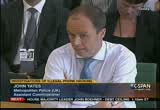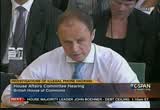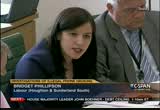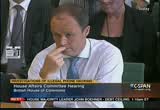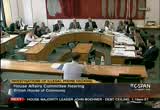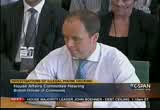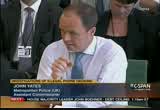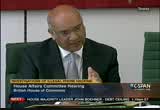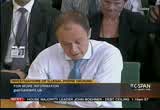tv Tonight From Washington CSPAN July 12, 2011 8:00pm-11:00pm EDT
8:00 pm
in medicare and because the amount of the medicare voucher won't be tied to rising health care costs, seniors will be forced to shoulder the burden as health care costs increase. according to the nonpartisan congressional budget office, in just 10 short years out-of-pocket health care expenses for a typical 65-year-old will double under the republican budget. . in 2030, a new retirey will be paying out of pocket medical expenses. it makes seniors pay the bill. plowponets voted to end medicare for our seniors because they say they can't afford it, but they are pushing for millionaire tax giveaway s. and makes seniors pay the double health care costs.
8:01 pm
big oil get subsidies, millionaires get tax breaks and corporations pay less taxes. we are hearing that they want to cut medicare. they are proposing to pay even more for medicare benefits through higher co-pays or higher premiums. the solution is fixing the real problem of increasing health care toss costs for all americans, not shifting cost burdens on our seniors. that's not going to work for the 40 million seniors enrolled in the program that have medicare for their health and economic security. that's not all. next week, republican will push a cut in medicare yet. it is pulling the rug from under the seniors in the name of
8:02 pm
cutting spending. this amendment is designed to make it easier to reduce the deficit by slashing medicare benefits rather than slashing loopholes for private jets. we would have to privatize medicare completely and raise its eligibility age to 67. by forcing congress to keep spending at unheard of levels, we would inevitably shift the real economic burdens onto the nation's most vulnerable, the elderly. it would make it impossible to reduce, but it would allow congress to destroy medicare with a simple voice vote. well, i think that our federal debt and budget is more than just about dollars and cents. the way we spend our money is a statement of our values and priorities.
8:03 pm
republicans want us to believe that cutting benefits to seniors is the only way we can solve our debt crisis, but i say there are other ways. the debt must be addressed, but should be date of birth in a way that is fair for all. the average senior lives on $19,000 a year. we should not balance the budget on the backs of our nation's seniors. we must protect and strengthen medicare, not gut it. these talks are about priorities. and my priority is keeping seniors in their own homes, communities and off the streets. thank you, congressman tonko. mr. tonko: you raised an interesting fact with the end to medicare proposed by the republicans in the house. the cost shifting that takes hold. it's about a twird--- twird --
8:04 pm
2/3-1/3 split, even those out of pocket can be demanding but to shift that now to flip it to 1/3-2/3 where 32 cents on the dollar is what you are provided with your voucher and what you suggested through the course of time, it will not reflect the growth in health care costs because they don't index it correctly. you start with a 1/3 burden of what government will contribute. that means 68 cents out of the pocket for seniors. i don't know how they would afford it. i represent a disproportionate high number of high number of sshes in new york state. and this would be a drain on a
8:05 pm
lot of households and the costs they would have to absorb with pharmaceutical costs that enable them to either recover or at least live in some sort of dignified manner, it is really a strong concern. and for the groups who are proposing this to have the audacity to suggest that it's what congress gets when congress is getting 72 cents i believe, on the dollar for their health care coverage. every dollar of premium they pay, 72 cents is covered as opposed to the 32 cents they would have go the way of senior citizens, nothing could be farther than factual than what they portrayed here. there is a cost shifting that is a painful measure. seniors in my district say hands off the medicare.
8:06 pm
if you want to do anything, make it even stronger. protect that medicare program that now for 45 years has worked so well. and worked in a way that has addressed the dignity of seniors in their retirement years. we thank you for your participation here this evening. we have been joined by a colleague from the state of maryland. donna edwards. ms. edwards: it is maryland's 4th. and in the 4th congressional district in maryland just like across the country, people in my district are stymied at the idea that we would reduce medicare benefits and we would end them and shift costs on things like medicaid to our states, that we would reduce benefits for social security.
8:07 pm
all of this in the context of a conversation about lifting a debt ceiling and making cost cuts to things that impact our debt, our long-term debt and our deficits when i just wanted to point to the gentleman, most americans don't know this, but i think they need to understand as you can see here from this chart that the largest portion of our long-term debt is caused by the bush-era tax cuts, not by medicare and not by social security. to be sure, one might argue, i think, that we need to make sure that medicare and social security are solvent for generations to come, because we want to honor the contract that i've made with my mother, that my son has made with me, but that shouldn't be anywhere near
8:08 pm
this conversation about lifting the debt ceiling, because it isn't the burden of seniors and those with disabilities to bear the burden of paying for these bush-era tax cuts that make over $250,000 instead of shifting that burden where it needs to be. mr. tonko: if the gentlewoman would yield. when you talk about this debt, we need to state clearly, these were off-budget. the wars during the first years were paid for by borrowing and we borrowed from china and other nations to pay for this because they were totally off-budget. people need to know this debt ceiling off-limit authorization are to pay for bills from decisions made in prior administrations that came before
8:09 pm
the 112th congress. it is an authorization to pay bills and there are many who are suggesting we have to cut spending including ending medicare. ms. edwards: i think sometimes i would like to think that perhaps what we are talking about with the ryan budget that we have heard so much about and with these other ideas is about changing medicare but it's not about changing medicare. it's about ending medicare, turning it into a system that our seniors and those with disabilities would get a check or a voucher and then negotiate with their insurance companies. i have to tell i, although my mother is a pretty tough negotiator, it would be tough for me to imagine that they would have to negotiate a better health care cost a better health care system.
8:10 pm
the only one who wins in that game are the insurance companies. mr. tonko: if you would suffer an interruption, if we talk about the beginning days of medicare, the pro pencity to do something then would be the same cause today because people are being impacted by cherry-picking, unaffordable rates, inaccessible outcomes, where there was no desire to write a policy for some. as we look at the age curve rise, it was 70 years of age. that has grown. and you are going to have more people living longer and we need to strengthen medicare. but to end it when people would go back to this rat race of trying to find someone to cover you, it puts insurance companies back in the driver's seat and
8:11 pm
they would have little control over their destiny and what can be documented clearly from that time in 1965, 1966, is that the economic vitality of senior households, that did your built of their income status was held harmless with medicare and used to dip south because health care costs would drain those retirement incomes in some format that would i am pofferish our senior community. we are going to head back into the disaster of pre-1965. ms. edwards: you point exactly to what the problem is. that rather than our seniors facing their older age with some degree of certainty about being able to meet their health care needs, instead, we throw them out to the wolves. and that's why the gentleman
8:12 pm
from new york and this the gentlewoman from maryland and all across our democratic caucus, we stand firmly united behind protecting medicare benefits from those kind of cuts and really from demolishing the program. can you imagine -- i just turned 53 and for those of us who are under age 55, that we would have to, starting now, dig into our pockets, saving up to $6,000 a year so we could actually pay for costs. that would mean between now and the time of my retirement, i would have to save up to -- almost delurs 200,000 to be able to meet those costs, and this at an age when i should be thinking about how i saved up to this point to have a more comfortable retirement. that's the predicament that the
8:13 pm
ryan budget that was passed by the majority of this congress, that that would be the result. we may not know the dirty details of the proposal for -- that some on the other side have for medicare in the context of this debt ceiling, but we can only imagine if their true gift that they want todd give to the american public and griff to our seniors is a plan that would decimate medicare, i can only imagine the plan for cost savings which would be quite devastating to our seniors as they look to increase out-of- pocket costs. and what a lot of people don't understand as they get caught in the business of discussing things like the consumer price index. adjusting things is a fancy word
8:14 pm
for saying cuts. i like to say the word cuts as what has been described on the table for medicare. cuts would result in our seniors having to meet more of the pockets for their health care. i talked to seniors in my congressional district who told stories about how commalinging it is for them to meet their day-to-day needs and they rely owe social security and on medicare for their health care coverage. they even do things like to save money, save money on their prescription drugs. they may split that heart medication in half. consider if you will, if some of these proposals were to go into effect, rather than splitting the pill in half, they would be splitting it in thirds. this would have a devastating impact on our seniors. and some have suggested and the
8:15 pm
gentleman from new york understands this that this is about scare tactics. the seniors in my district don't need a scare tactic, they just need the facts. and the facts are that those on the other side in exchange for providing this huge orange clump here in bush-era tax cuts for the wealthiest americans, 2 perers who make over 250,000, rather than have them pay their own way, we want to tell them, dip into your pocket, negotiate with health insurance companies because things happen. they say, nope, we can't cover you and if we do, it will be a for a real premium. this will be devastating. the most i admire nor those who
8:16 pm
enacted medicare, it was about how we feel about one neighbor to the next and one generation to the next, that bond that says we care about each other, that we don't want seniors left out in the cold when it comes out to the cold and i know the gentleman wants to keep it, too mr. tonko: you struck on a cord that is repeated over and over again in my district. many thought, well, if the seniors are told this will affect senior communities into the future that they'll get buy-in from today's senior citizens. i'm impressed with the very generous statements made, the advocacy embraced by our senior community of today. saying, this is certainly -- has served me so well, i don't want it denied my children or my grandchildren and as you pointed out, you know, a 54-year-old of today will have to save about
8:17 pm
$182,000 out of her or his pocket in order to pick up the slack that would be part of this shop on your own, you know, putting the insurance companies back into control, seniors are going to get a vouch that are covers 1/3 of the costs that they need to have health care coverage and then dig into the pockets for the rest. so that means a 54-year-old of today will have to save $182,000 but then the 30-year-old will have to save $400,000. where are we going with this? this is all to cut a program that has served with dignity the senior community of this country all to pay for the bush-era tax cuts. so this is a way of sliding savings by ending medicare and bringing it over to pay for millionaire and billionaire tax cuts and for subsidies of oil companies. this is as vulgar as it can get and to attach this to a
8:18 pm
discussion on debt limit where we look for authorization to pay our bills just like america's working families roll up their sleeves, earn that money and pay their bills, they expect the government to do the same thing. and to play a game on medicare where you deny access and affordability for a basic corps human need after a record of tremendous performance since 1966 is i think so objectionable that it's no wonder when we go home, when you go to maryland, when i go back to upstate new york people are saying, hands off my medicare. ms. edwards: if the gentleman would yield, they're saying that with good reasons. it's because it's worked, it's because our seniors are no longer wondering in their golden years whether they will be able to meet their health care needs. it's because our seniors are not -- and their families are not struggling to make sure that those health care needs are met. it would be one thing if we were
8:19 pm
arguing about a program that was inefficient and not cost effective but every single piece of data about medicare tells us it's more efficient than the private sector, that in terms of its cost effectiveness it's more cost effective than the private sector and what i like is that when we pass the affordable care act and the gentleman will remember this is that we actually did some things to really strengthen medicare. i'm proud of that. and i do want to have the discussion about making sure that we strengthen for future generations medicare, social security, these important safety net programs and i don't know about your district, the gentleman's district, but i know that in my district in maryland people have lost their 401-k plans, they've lost their private pensions to the extent that they've had them, they've lost value in their homes. the only thing they have left in
8:20 pm
their golden years is their retirement, their medicare and their social security and they're counting on us to protect that. perhaps it is that unfortunately this debate about raising the debt ceiling which i think is an imperative, a moral imperative for us to do is actually crystallized the bright line between those of us who want to protect medicare and social security and medicaid and those who want to destroy it. those who have long held the belief that these systems should be privatized, somehow that market that fell apart yesterday would, if we were investing there, that that would protect people's retirement security when all of us, each of us knows that that won't be true and so i'm interested in making sure that the 2%, those who make over $250,000, should not have to put
8:21 pm
the cost and have the cost shifted to our seniors to bear the cost for their tax breaks for corporate loopholes and for things that our seniors didn't have anything to do with and that's why i like the bright line test of those of us who want to protect medicare for future generations and those who want to destroy it. mr. tonko: very well said, representative edwards. i just want to attach my comments to yours about the impact of medicare, an investment that has produced a lucrative dividend. we've kept the dignity factor alive to seniors, we have kept our seniors well, we've enabled them to recover, we've enabled them to live because of an attachment to a health care plan. on the other side we have allowed for spending, for a tax cut for millionaires and billionaires, spending on the tax cut for millionaires and
8:22 pm
billionaires time and time again, knowing that the result is no real lucrative dividend. negligentble. and we look at not only the spending that people acknowledge was ok for something not returning a dividend, we lost 8.2 million jobs in the bush recession, but then we borrowed all the money to spend -- needed to spend for that tax cut. what a contrast. and the democrats in this house have said, no, let's do programs that have a return, let's invest in our senior community and let's not spend on these tax cuts that have no dividend, no lucrative dividend. and if we didn't have the money to spend for tax cuts for millionaires and billionaires, why then did we go and borrow from china and saudi arabia? so it makes very little sense to follow that road to ruin which the republican plan, once the ryan plan, now speaks to. we've been joined by representative jackson lee from
8:23 pm
the state of texas. welcome, representative, and thank you for joining in the discussion on the attempts here to end medicare and to allow for those savings to go toward spending on tax cuts that get somehow attached to a discussion on debt ceiling being -- the debt ceiling being raised so america can pay her bills. it's convoluted at best. jackson scrax jackson i'm glad i have the opportunity -- ms. jackson lee: i'm glad i have the opportunity to join the gentleman from new york and focus on his leadership, along with my colleague from maryland who, as we were developing the affordable care act, worked so hard on some of these finite issues, ensuring that we had the oversight over the insurance rates. we tried to do everything that we could to produce legislation that embraced the concept of medicare, for example, recognized and respecting medicare, and then broadening the concept to ensuring that aum
8:24 pm
people had access to health care, but isn't it interesting, just a few months later we're standing in the well of the house and we're literally having to hang on to the commonsense program of medicare and if i could, i'd like to frame the discussion in this manner, you have articulated a very commonsense approach that in any debt ceiling, by the way, let me give my editorial comment, i voted for a clean debt ceiling, just simply to pay america's bills. unfortunately that didn't carry the weight of the day, but what i will say is that the discussions that are being crafted in the media or at least been perceived in the media that our republican friends want to provide to the american people is that we are broke, that we have no way of doing anything and i want to be very clear, i am aware that americans are out of work. i'm aware that we've had six months without a jobs bill and
8:25 pm
that democrats are trying to put one on the floor. but i want everyone to know that we have had a significant recovery because of the american recovery and reinvestment act. so we are moving forward except for fact that we've got to get jobs. we've had seven consecutive quarters where the g.d.p. has grown. so to make our seniors the brunt of what we have made up in terms of saying we have no money, we cannot think any other way, we have to hit someone who has paid their dues, if you will, is simply wrong and unfair. as i said, we're not where we want to be but the sacrifices that democrats have made in their recovery and reinvestment act have put us forward, in addition we've seen growth. now we have a budget, first of all we started off in 2011 with a budget, a ryan budget, that then suggested that we were so
8:26 pm
broke we had to voucher medicare and frankly vouchering medicare is extinguishing medicare. it's eliminating medicare as we know it. it is telling a senior that you need a dollar's worth of health care, we can give you a quarter. we're going to give a senior who has invested in america, who has worked all of his or her life, who as my colleague has said maybe has fallen on difficult times with a 401-k and certainly that is because markets have gone up and markets have gone down and you're going to say, you're ggget to get a quarter. now, -- you're going to get a quarter. now bring us forward. that bill was passed by this house, the predominantly republican with any number of members who believe there's nothing wrong with that, it has gone nowhere in the senate. now we're at a crucial point where the president has asked for us to all be adults, to sit around the table and talk about how can we work this together? can we do it with airplanes and
8:27 pm
jets? can we let the bush tax cuts expire? can we call upon our friends in the energy industry that is leaps and bounds and profit to craft or to understand a way that we can recraft those particular provisions, to bring that money here into the federal government? and i want to say to my good friends in business where it might be. the climate of the united states allows you to thrive. you are doing better because you live in a democracy, you live in a place where we respect property, where we don't run into a corporation and say, i think i'm going to take about, you know, half a trillion dollars from you if you have that much, just send that check over to the united states treasury. we don't do that. so i want the point to be made tonight that we're on the side of the angels because it is absolutely ludicrous to not see the difference in life span pre-1965, before linden johnson, a fellow texan, announced his
8:28 pm
desire in the great society to find a way to in essence respect the senior citizens, the elderly and at that time he was probably looking at individuals in their 60's because of the wear and tear and the lack of health care , to be able to give them an extra life line, to say that he was right and to make sure and i just want to add these points as i come to a close, to be able to suggest that the millions of seniors who now have access to guaranteed benefits are in jeopardy because of the games that are being played about the debt ceiling, a simple procedural vote if you will that allows the debt ceiling to be raised so that we can pay our bills, something that we've done if i may put in the record some 74 times since 1962 with no war he will whatsoever. and -- with no quarrel whatsoever. and i would argue this, many of those on medicare are families
8:29 pm
of veterans themselves -- veterans, themselves obviously may have served, but they are people who are willing to sacrifice to build this country. they're seniors. and for us to take away this lifeline is unspeakable and i hope that as democrats we'll draw a few friends, a few reasonable friends to know that there should be no tying of raising the debt creeling to medicare, there should be a tie to raising revenues. that's the commonsense approach. mr. tonko: well said, quickly approach this deadline by which the debt ceiling has to be raised and to put the added pressure of ending medicare into that discussion is vulgar. 46 million americans are watching this and they know that they're at risk here, simply because people want to unnecessarily attach the end of medicare into this discussion and, you know, as representative
8:30 pm
edwards said earlier, we've improved it with the affordable care act, we've allowed for a no deductibles, no co-payments for annual checkups, for certain screenings, we're making it stronger, we're trying to get prevention in there, to bend that cost conserve, -- curve, we're looking, many of us, to allow for bulk purchases of pharmaceuticals which we do with medicaid and we do with the v.a. program, but it was not allowed when some of these -- the bush agenda was authorized. representative edwards, that chart that you're holding there tonight is still haunting me because i look at all of that debt that was assumed for tax cuts for millionaires that now they want to do again, continue forward and i look at the wars that were not paid for, i look at, again, the medicare part d program that was part of that growth of debt that we're now being asked to pay as the bills have accrued, the interest that we would have to pay if we don't raise that debt ceiling is
8:31 pm
astronomical. so, again, we welcome you to the floor this evening on a very important discussion and your thoughts? you were going into the concerns for medicare being ended, for those that count on you to be their voice here in the house. . >> it's wonderful to join my colleagues in this discussion. it's so important for the american people. ms. edwards: 46 to 47 million people, americans, rely on medicare for comprehensive health care coverage. when medicare was first passed, more than half of those who are over 65, didn't have any health care coverage, more than half. today, that's not true. 30% of the number of elderly americans who lived in poverty before medicare and that number is now reduced to 7.5%.
8:32 pm
so the changes brought about in the quality of life in the lives and health care of our seniors has improved radically since medicare's passage in 1965. and so, what would it really mean to end medicare? well, it would mean that those seniors who are in my congressional district and around the country, would be subject once again to perhaps being one of the more than half of those who would not have comprehensive health care coverage. and i am struck as your when i look at these lines of what is really causing our long-term debt. and i see this big orange glob right here into the future. and i realize it's the bush-era tax cuts for millionaires and billionaires and how fair is that to those living on medicare and social security.
8:33 pm
i look at the wars. some would argue that those wars are unsustainable into the future and yet they comprise a substantial portion of our long-term debt because they were never paid for when we engaged in those. i looked at the trouble assets relief program into the future. but what i see there is this thin blueish line and what this means is that we have paid that back under the obama administration and democratic control of the congress. and then we have this big glob here that's about the current economic downturn and it strikes me if the congress really wanted to do something if the majority wanted to do something, leave medicare alone, leave social security alone, leave medicaid
8:34 pm
alone. focus on getting jobs and 27 million people back to work so they can contribute to our tax base and contribute to medicare and social security. do a jobs prap and that will strengthen our programs. mr. tonko: i would say, too, that and congresswoman jackson lee, medicare, yes, speaks to the health care needs of senior households, but there is a stability there, there is a security so that some of the available expenditures that are out there today from seniors investing in their community, spending in their community, would be lost. so the economic recovery gets threatend and when i look at this, all through that blob of colors, of which you speak, all during that time is a loss of 8.2 million jobs. where was the benefit of all of this relief way high on the
8:35 pm
income ladder? there wasn't a corspoppeding benefit. we need to know what works and works well. why would we threaten medicare? i'm on the budget can committee and today we had a hearing with secretary sebelius and when you talk about bending that curve, the republican plan and they toss it to the market for the shopping to be done by our senior community, there is no bending of the cost curve. they are saying sharpen the pencil to help our seniors. we have watched since the start of medicare, the private sector insurance costs have risen by over 5,000%. the track record on medicare, no administrative burden to speak of, no heavy one, no marketing budget, no wasteful
8:36 pm
expenditures, no high profit columns. we have seen back-to-back columns go out of sight for these industries. when we look at these and we say, you need to go back to the bank and borough and end medicare that is helping the insurance industry, that is like helping those who are looking for more business at the expense of containing costs and shedding a program that has worked for nearly half a century and that people have felt it should be there for their children and grandchildren. that is uniquely american. that is uniquely american and shows the degree of sensitivity, compassion, ability to make things happen. and a budget, a plan we put together here is merely a listing of our priorities. what do we deem most essential?
8:37 pm
and when you can reach 46 million people and provide guaranteed health care, that ought to be a high priority, not taking the savings of ending medicare to pay for millionaire and billionaire tax cuts, oil industry handouts, let's get real here. let's get compassionate and understanding of what we're ending as a sound bit of history. ms. jackson lee: if the gentleman would yield. i thank you for your passion and what you're saying makes me think of what we're doing to even the younger generation because you have made a point of what has lasted over half a century, over 50 years and it is a framework that can be in place for those who are young. and if we take it apart, we will not have this structure that is
8:38 pm
helpful. there is no reason to argue against modernizing, looking at ways to improve medicare. our republicans are talking about ending it as we know it and the running of the bull. and frambingly, i have this image on a voucher plan of the running of the bulls, run of seniors trying to get the last voucher, trampling each other because they are seeking that one lifeline they need. medicare is the infrastructure of our hospital system. you cut into medicare, you are talking about closing hospitals and eliminating physicians and ending care as we know it. is there any understanding to the fact that we need to be adults and sit down -- when i look at my city of houston, i
8:39 pm
spoke to my swepts on sunday, held a press conference to indicate my commitment to help preserve social security, medicare and medicaid. the idea is that this will impact our city. we will see jobs lost, businesses closed and people having the inability to care for themselves or their senior family members. this simple issue of a debt ceiling speaks, i think, very eloquently to the need for common sense and you have laid out a very clearly and had it for this period of time, and we have been able to keep a structure that has helped to save lives and that this amount of life and will have a longer life to make sure there is no waste, fraud and abuse. and for me, i cannot imagine a picture of seniors trampling each other to get their last
8:40 pm
voucher or being told by their government, a country they served for, worked foru there is no room at the inn for you. no more medicare. by the way, we had to give the billionaires and rich folks a long period of time, tax holidays and we didn't have any opportunity for you. that is unacceptable and it is un-american and i think we can do better and we need to protect medicare. and i would encourage and welcome, my friends, to join us in doing the right thing. mr. tonko: you talked about strengthening and improving medicare, not ending it. some have suggested as much as $156 billion could be saved by bulk purchasing for our pharmaceutical needs for the program, for medicare.
8:41 pm
that is a savings of $27 billion as the number for seniors themselves, because there is a fraction they assume in those costs. if we do that, we send over not only to the federal government, but to the senior community also. there are ways to address fraud and inefficiency. the "new york times" presentence reported that there were double chest ct chest scans being done and the federal government was overbilled by $25 million. that is a small example of the need to continue to stay vigilant. but make it work, string then it and provide for that continuation, just the stability that we can provide, enable seniors to breathe more easily and a basic core need for them,
8:42 pm
any of us grows older, you are going to require that health care attachment. and how dare we, i say we, how dare they, a republican majority in this house that it's worked well and been there for seniors for 46 years but we are ending it because we are going to box the situation. you want america to pay her bills, we are going to deal with spending cuts and going to start with social security, medicare and medicaid, isn't that nice? that is nice, because the people who weep deserve our voice to be heard resoundingly to say we defend the program and defend the recipients of the program. representative edwards.
8:43 pm
ms. edwards: pled somehow, in this discussion of lift lifting the debt ceiling that each of us voted to vote that debt ceiling. that is our moral responsibility and our obligation to meet the full faith and credit obligations of united states. but that's not what this discussion is. and it is precisely the reason that i caution us against putting into the debt ceiling discussion any changes to medicare benefits and social security benefits and medicaid. and the reason is because, as i've demonstrated by showing this chart -- and i would love to say this is my chart ks but it's not. it was produced by the independent congressional budget office and it shows the contributing factors, the
8:44 pm
significant contributing factors in these colors here of the long-term debt. and that's what we are talking about, raising the debt ceiling to meet those obligations that have already been laid out. and some people have described that those of us who are speaking in favor of medicare and social security and making thur that we protect medicare and beneficiaries from cuts. but that passion is connected to fact. it is connected to the fact that we are passionate about the benefit of medicare. it's connected to the fact that we are committed to lowering prescription drug costs by closing the doughnut hole, where as the republican budget would open that doughnut hole all over
8:45 pm
again for our seniors, causing them to dip into their pockets to meet their prescription drug needs. the gentleman from new york has pointed to ways which we could negotiate prescription drugs in bulk so we could lower our costs for our seniors. but that's not what is on the table. those who are passionate, we want to ensure our seniors are receiving primary care and getting preventive care so it does then do that cost curve. but it's rooted in fact. and what is really true is the fact that our seniors did not caution the significant factors that are related to our long-term debt. i want to repeat that to the gentleman. i know that you know this, but it's really important for the american people to understand that the contributors to our long-term debt are tax cuts that
8:46 pm
are not paid for for millionaires and billionaires. we should get get rid of them and not put them on the backs of our seniors. the wars in iraq and afghanistan, the president has already begun a drawdown a it could be significant so we save in the long run. making certain that people are back to work so they are contributing to our tax base in a way that we need. and we know that we have to raise revenue. we must race revenue. our seniors understand that. but what we cannot do is shift the burden for these things that were not caused by seniors onto the backs of our seniors by pushing them into really unfair cuts to their medicare and social security benefits. . mr. tonko: i'm going to do a bit of close and then ask each of
8:47 pm
the representatives that remain here on the floor, we were joined earlier by representative chu from california, to offer your sentiments and then we'll bring the hour to a close. but you know, what i think is very important to note is that if we can find ways to save on medicare we should invest that in medicare to strengthen medicare. if we can find ways to save in social security, reinvest in social security. they deserve to be stand alones because they are prime, prime opportunities, programs for strengthening the fabric of america's families. so that should be a separate turf and not be using these dollars, these savings as the republicans would end medicare to somehow bring that over to fungible fashion to pay for these tax cuts. you know, today i talked to my medical colleges and they are going to get impacted by the cuts to n.i.h. they have in the new york state, we probably have over $1 billion in revenue streams that go to
8:48 pm
hospitals for research. so you cut the n.i.h. program, you put more people out of work and you cut a revenue stream for hospitals that need to train the human infrastructure that will make all of our health care programs work. similarly when you look at our need to compete effect niffle a global economy on clean energy and innovation, the winner that have race will be the go-to nation that will create stability for generations of their workers. why shouldn't america be number one in that investment? so if question findings somewhere or if we do create revenues, they need to go into investments to grow jobs. that's what america told us at the polls last november. we want jobs to be the number one priority. we haven't done a jobs bill in this house. but we've come up and found ways to end medicare which is vulnerable, which right now is so vulnerable to this discussion on the debt ceiling limit. we have to end that crazy plan and we need to go forward with a sensible plan that enables us to invest in jobs, invest in our senior community, invest in
8:49 pm
their well-being and to again see these two programs, worthy of saving and strengthening and if we have the economic means let's do it. representative jackson lee, we'll go to you and then to representative edwards and we'll be done with our hour. ms. jackson lee: thank you very much for leading us in this discussion. the message should be, albeit we have some concerns we are not broke, we need to fix jobs and investment and we need to save medicare, medicaid and social security. they have not contributed to our debt and we cannot allow seniors to run like bulls to seek medical care in this great and wonderful country. i for one will not stand for it. thank you and i yield back the balance of my time. mr. tonko: thank you. representative edwards, and then we'll be through. ms. edwards: i thank the gentleman for bringing us together. i hope what the american people understand is that the democrats in this house are prepared to protect medicare benefits and social security benefits for our seniors and for future
8:50 pm
generations, that our young people should know that as they enter the work force, because we are going to make sure that they have jobs for the future, that they will be contributing to medicare and social security for future generations. this is really a values test. this is where we have to have the perfect alignment of policy, of politics and our values and that rests in protecting medicare and social security from benefits cuts and with that i'd yield. mr. tonko: thank you. thank you very much. with that we yield back, mr. speaker. the speaker pro tempore: the gentleman yields back the balance of his time.
8:51 pm
the speaker pro tempore: under the speaker's announced policy of january 5, 2011, the chair recognizes the gentleman from iowa, mr. king, for 30 minutes. mr. king: thank you, mr. speaker. it's my privilege to address you here on the floor of the united states house of representatives. and to bring to the attention of this body some subject matter that doesn't often get a debate here on the floor but it does get some discussion in special order time and sometimes in the one-minutes and five-minutes that members present to you here in this great delishtive place that we have the privilege -- deliberative place that we have the privilege to serve in. one of the things that i want to bring before your attention here this evening is the immigration issue here in the united states. and it's something think a don't
8:52 pm
know that has been discussed here for some time. but i bring this forward because it's an important issue. it's very essential that we sustain and maintain and enhance the rule of law here in the united states. and so i bring this forward and the number of things are on my mind. the first thing that comes to mind for me is a subject that was reported on fox news july 11 and i picked up this article and i want to express this to you on what's going on. i introduced early in january, one of the first days of business here in this new 112th congress, the birth right citizenship act of 2011. and, mr. speaker, i brought this act forward working with people who have been leaders on this issue for some time and one of them would be our friend, nathan deal, now governor deal of
8:53 pm
georgia, who was the lead on this issue when he served here in the united states congress and it also -- some of the successor people who were involved in that would be congressman phil gingrey of georgia and the incoming freshman from georgia, rob woodall and from california, congressman garry miller one who has been a strong to opponent of the rule of law and the rights of american citizens. these people and others have been strong, strong supporters of the birth right citizenship act and because of my role on immigration committee where i have been for now going into the ninth year, it seemed to be a better fit for me to carry this piece of legislation and so i step forward with it because we need to take a position. what's going on, mr. speaker, is that in the united states of america, the people that erroneously read the 14th amendment of the constitution, in the component that addresses what we call birth right citizenship and it says in the 14th amendment that all persons
8:54 pm
born and/or naturalized in the united states and subject to the jurisdiction thereof are american citizens. all persons born or naturalized and subject to the jurisdiction thereof are american citizens. now, the circumstances are that this created a misinterpretation of this section of the 14th amendment, it has created birth right tourism and so we have -- might see a $30,000 turn key operation going on where a pregnant woman in china and she'd probably have a benefactor that would sponsor this could receive a turn key operation for a little tourism trip in the united states. get her on an airplane, smuggle her into the united states one way or another, she would have a baby, she'd be 8 1/2 months pregnant, have the baby in the united states, the baby would get a nice, new american birth certificate with its little footprint stamped on it and then that baby might go back to china
8:55 pm
with the baby's mother or the mother might stay here in the united states with family and friends, relation, whoever might want to harbor that mother and/or child. and when the child's old enough, the child can sponsor the extended family to come into the united states by virtue of that automatic citizenship that's conferred upon a child that's born here to an illegal mother and a who knows father. that's going on not just in rare circumstances and not of course -- certainly not just with chinese, in fact, that's not one of the larger numbers. it's happening in this country someplace between 300,000 and 4 tsh 30,000 and 40,000 times a year. we have people who sneak into the united states for the purposes of having a baby so that baby can become an american citizen and i believe as the chairman of the full judiciary committee and lamar smith believes that citizenship should be precious. it should be precious. it shouldn't be dealt out, it shouldn't be something you can buy a turn key ticket to game the system, to have a baby that then just automatically is an
8:56 pm
american citizen, subject to the jirs diction thereof. mr. speaker, i want to argue that that chinese woman that flies into the united states with a $30,000 turn key tourism for birth right is not subject to the jurisdiction of the united states, not in the way that was envisioned by the people that wrote the 14th amendment to the constitution. 14th amendment to the constitution was put in place to guarantee that the babies born to formerly slaves and at that time of ratification freed slaves would be american citizens. they wouldn't -- the babies born to the freed slaves would not be denied all of the rights of citizenship as were guaranteed to them in the 13th and 14th amendment. and it took into account that babies born on indian reservations, some of them would have lost their rights, their tribal rights on those reservations if they had become automatic american citizens.
8:57 pm
so some of the native americans said no, they didn't want that conferred upon them. our founding fathers, excuse me, it wasn't the founding fathers but the drafters of the 14th amendment then wrote language in to preclude automatic citizenship to any homosapien that was born within the intertore of the united states, they also had to be subject to the jurisdiction thereof. and this congress went through a great deal of debate in the house and the senate on what that actually meant in the clause subject to the jurisdiction thereof. it was not contemplated that the children of diplomats would become automatic american citizens, it was not contemplated that certain native americans born in certain reservations would be subject to the jurisdiction thereof and become american citizens but it was contemplated that the children born to freed slaves would be american citizens. it's a guarantee, that's the guarantee and it was written with a significant amount of wisdom they could not have
8:58 pm
anticipated that america would get so lazy and so lax that this constitutional amendment would drift its way into a practice, an erroneous practice of confirming automatic citizenship on mostly any baby that would be born in america. here's how it is. if there's a plane flying through the united states and let's just say that this plane is bound from china to toronto which does happen, mr. speaker, and it was going to be a flight that was going to be a direct flight and drop into toronto but because of weather conditions or maybe mechanical problems it had to land in chicago, now let's just say that if that -- if there's a woman pregnant on that plane who is flying into toronto and the plane lands in chicago and it's stuck there for mechanical repairs or a weather-related delay and the woman is inside the security and has the baby, the baby's not an american citizen.
8:59 pm
but if she walks through the security, goes outside of security during the layover and has the baby out there, this baby is an american citizen. that's what's been going on in the practice of this automatic citizenship that i think is an erroneous, misinterpretation and i think a willful misinterpretation or probably more offer a -- often a lazy interpretation of the united states -- of the 14th amendment of the constitution. and so i've introduced the birth right citizenship act of 2011 along with the friends and colleagues that i mentioned and many others and a good number of co-sponsors who take the position with me that if a child is born in america has to be born to at least one legal parent in order to be a citizen of the united states. it's pretty simple, it clarifies the 14th amendment, it clarifies the clause in the 14th amendment subject to the jurisdiction thereof. congress has the authority to do that and i got concerned about this when there were a couple of
9:00 pm
senators that were talking about the need to amend the constitution, to fix this problem. mr. speaker, it doesn't require a constitutional amendment to fix the automatic citizenship practice that is so flawed that it confers an automatic citizenship on as many as 750,000 babies born to illegal parents here in the united states. and giving you an example, as i said it's not just a chinese woman that comes over here pregnant to have the baby here and that hams on a very regular basis but it's -- happens on a very regularly a basis, but it's often someone who comes in from neighboring countries. we know that of the criminal aliens who are in our prison, 2/3 of them come from mexico. one might presume that a similar number of these automatic citizenship babies also their mother is a citizen of mexico in the united states illegally having the baby here and picking up that automatic citizenship, that birth certificate that may
9:01 pm
or may not go back to their home country but you can bet that when the time comes that that child will already be programmed to petition for the family reunification plan which has our immigration plan in america out of control. so what do we do about this? birth right citizenship act of 2011, and it should be a simple decision for this united states congress address this situation, but some will argue, well, subject to the jurisdiction thereof means nothing that clause of the 14th amendment doesn't have meaning, therefore it requires that they all be citizens. i think that is a very thin and very marginal argument at best. the clause must mean something. all persons born or naturalized in the united states and subject to the jurisdiction thereof are american citizens.
9:02 pm
there's a reason it says and subject to the jurisdiction thereof. if everyone born in the territory of the united states is automatically a citizen, you would strike that language from the 14th amendment, and subject to the jurisdiction thereof, and it would say all persons born or naturalized in the united states are american citizens. if that was the intent, that's what it would have said, mr. speaker. but it says and subject to the jurisdiction thereof and the definition of that phrase is subject to the interpretation of the understanding of what it meant at the time of the ratification of the 14th amendment and it meant subject to the jurisdiction thereof didn't mean there were going to be automatic citizenship on illegals. granted we didn't have much for immigration laws at the time. there wasn't enough human migration to be very concerned about it. but they clearly didn't intend to confer automatic sintship on
9:03 pm
native merps born on reservations that were not subject to the united states and they didn't intend to confer citizenship on children of diplomats or tour is. i explained the tourism part about what happens with a plane that lands in chicago on its way to toronto and a baby is born. excuse me. and so -- we've gotten lazy and lax with the practice of conferring automatic citizenship. so people don't challenge it. and i'm really worried about an administration, actually i've been worried about a couple of those administrations since i arrived in this town, that don't seem to have much vigor
9:04 pm
for enforcing immigration law. it's frustrating to be here in the united states congress, pounding away, to have to pass legislation to fix something that's just a matter of intellectual lazyness, but the people enforcing this, the people handing out birth certificates almost hike candy aren't challenging it. they don't have a very good constitutional understanding, or there'd be pushback from the other countryside. but in the o.b. ward they've got to have stacks of these birth certificates an when a baby is born, it's almost an automatic process, here's the footprint, here's the data, here the birth certificate, send that child off, they're an american citizen. what do we suppose happens if the diplomat or wife of a diplomat or even staff oa diplomat comes into the hospital to have a baby? do they meet them at the door and say, are you a diplomat?
9:05 pm
are you on foreign immunity? do you think your baby will be an american citizen? we're not going to allow it. doesn't happen, mr. speaker. what happens is the children of diplomats are often confered with automatic citizenship because the whole system of america is so automatic that any baby born inside u.s. territory is given the paperwork and documents. here's an article that comes out on fox news, reported july 11, and the substance of it is this. the center for immigration studies, good, thorough people, i might add, the center for immigration studies says foreign diplomats are obtaining u.s. birth certificates and social security numbers for their newborn children effectively becoming u.s. citizens. on top of their new status in the world they carry an additional perk that most americans do not have,
9:06 pm
diplomatic immunity. it creates what c.i.s. describes as a super citizen. just like their parents, most are immune to criminal jurisdiction of the united states, creating super citizens. these super citizens are children of diplomats and all they immediate to have is a u.s. birth certificate and social security number and they're effectively an american citizen who is going to challenge it? there's no question mark or no question on the birth certificate that asks the question, are you a diplomat? are one of your parents illegal? american citizen -- a legal american citizen, perhaps? those questions done get asked. they routinely stamp the birth certificates and send the child off with citizenship. 340 to 750 times a year, some of it are those clearly not subject to the jurisdiction thereof. in fact, in the concluding
9:07 pm
statement in the article, you've got a statement here from one of the proponents of the policy that i advocate that says despite congress' clear intent to not create a completely universal and automatic birth right citizenship policy, the current application of the citizenship clause is so lax that the united states has a de facto universal birth right citizenship policy that denies u.s. citizenship by birth to no one. including children born to foreign diplomats. mr. speaker, that has to change. we intend to change that with the birth right citizenship act of 2011, h r. 140. i intend to be engaged in that in helping to move that legislation forward. when it gets to the point where he children of diplomats with
9:08 pm
diplomatic immunity are getting automatic american citizenship just because they were born inside the territory of the united states, perhaps not even born on u.s. soil but they might essentially be born in that solve rep territory of the embassy itself, still, american citizens. and then they -- and then, mr. speaker, we have also out of control legal immigration system. aside from the illegal immigration, which i talk about quite a lot, the legal immigration system. if we look back over the last decade, we'll see that we brought in roughly $1.-- brought in roughly 1.25 million legal immigrants a year. if you look at the new jobs created by the united states economy, those new jobs created average about 1.25 million a year. this is before the recession began. these numbers held up then and they're stronger now. but the new jobs created by the
9:09 pm
american economy have been almost exactly the same number of jobs that would be taken by the legal imgrants that come into the united states. if we had shut down, slowed down the legal immigration in the crites other the last 10 years, there would have been just, say, roughly, 10 million fewer immigrants in america and we'd have 10 million fewer unemployed americans. that's a simple way of looking at this. i don't po pose we eliminate all legal immigration, not by any mens, but what i do propose is that we do an economic analysis of this. when we look at real numbers of testimony that's come before the committee, under oath, data, here's what we have. a country should establish an imgrigs policy designed to enhance the social and cultural well being of the united states of america. that should be our task. and yet, with our legal --
9:10 pm
without legal immigration that legal immigration based upon merit, when we take a look at what that individual has to offer the united states, when we take a look at what they have for capital to invest or their ability to assimilate or their educational background or their relative youth so they've got some years to contribute before they start to draw from the system, these are all logical things we should ask for. but it's only between 7% and 11% of the legal immigration in america that's based upon anything that has to do with what's good for america and the plans of it would be 89% to 93% of the legal immigration in america is out of the control of the value judgment of the american people. in the hands of the legal immigrants or sometimes illegal immigrants themselves. it's out of our control. birth right citizenship is a piece of that that i'm not sure is part of this equation i've
9:11 pm
just deskibed to you. there's a family reunification plan that takes up a big chunk of this. once someone comes in, they can start bringing in family and extended family and it grows out like a tree to no end. we need to limit the family reunification plan. we need to roll this thing back around and base the legal immigration in america on merit again. what do they have to offer the united states? and mr. speaker, i'll say also, we had testimony before the committee, there were a number of strong, faithful representatives that testified there. some of them are national leaders in the faith community who argue that we need to find a way to accommodate the 11 million to 20 million illegals here in america and give them a path to citizenship. every one of them said they thought they should go to the become of the line. they should go to the back of the line. 11 million to 20 million illegals in america should go to the become of the line but we should give them means to
9:12 pm
earn american citizenship. going to the become of the line, which line? i asked them, which line? well, back of the line. now that's a talking point that apparently wasn't thought about any deeper than that because if they can't answer the question, which line, they surely don't know where that line is. is it in the united states? or is it in lines in the foreign countries, people waiting to come into the united states? i would submit that if those who are in the united states illegally are too go to the back of the line, it's not a line in the united states. the people in line to come into the united states legally are by definition not in the united states. they're outside the united states. they're in their home country. they're following the laws of america. they're lined up to come in the right way. god bless them for doing that. but that line that line of legal waitees, the line of people willing to respect american immigration law, get in line and wait in line, isn't
9:13 pm
scrust some short little old line you can put 11 million to 20 million people behind and think you'll process them through. that line of people who are respecting american laws and are waiting to come into the united states legally, none of them are in the united states. it's 50 million strong, mr. speaker. 50 million people have taken the trouble to line up to try to come into the united states legally. we are the most generous country in the world by far, letting in 12357b9 million legal immigrants. and meanwhile, 11 million to 20 million here in this cupry who have disrespected our laws. i would suggest that i would rather see 11 knoll 20 million who are in the line, respecting american laws, waiting to come in i would like to see them come in and become american citizens ahead of those who disrespected american laws. that sustains the rule of law. that upholds the rule of law. that strengthens us as a nation.
9:14 pm
rewarding lawbreakers weakens us as a nation and chisels away at the beautiful pillar of american exceptionalism called the rule of law. i hear arguments from people who have their own interests, their own viewpoint, they need somebody to milk the caws -- cows or they need somebody to take care of the equestrian herd or need somebody to do their gardening or need somebody to be their butler or their maid so they're saying, you know, i can't afford to hire somebody in this country, you need to bring me cheaper labor. i suggest that the director of the heritage foundation is right. we have become a welfare state. a household headed by a high school dropout, regardless of immigration status, costs the taxpayer $23,449 a year. and -- but it boils down to this. they'll draw down $32,000 a year in benefits, welfare
9:15 pm
state. they'll pay thrs 9,000 a year in taxes. and that's the change. that's the difference. when you multiply it times 50 years of managing -- managing the household, being head of household, 50 years, it costs the taxpayers an average of $1.5 million to subsidize that household. that's a high school dropout. it may not get worse when they're an illegal high school dropout, but it doesn't get a lot better. there's a net number he produces around the same price but let's say $20,000 a year, plus or minus $1,000 or $200 that -- or $2,000, for a household headed by a high school dropout. the weight on the taxpayers when we have an oversupply of cheap labor and an undersupply of taxpayers and 47% of households don't pay income
9:16 pm
tax, we're living in a welfare state and we're giving automatic citizenship to 340,000 to 750,000 bay bies a year born to an illegal mother who sneaks woo the united states an the president has the temerity to go down to the border in el paso and make fun of people who think like i do that say, let's build a fence or wall and a fence he said some will want a mote, some will want alligators in it. he was standing within 220 yards of this, mr. speaker. this is el paso, texas. this is juarez, mexico. . some people want a fence. i don't think there are any algators. but this is the picture i have seen before the president gave a speech in el paso. not many people are getting across the border here. why? here's the fns right here. this is the river. you have a fence, a river,
9:17 pm
another fence. here is a patrol road. here is a border patrol vehicle here. and then the patrol road, another fence, then a canal that has a lot of water and another fence. and if you can get into that, you are in the united states and then home free. not a moat. two moats, a fence, a patrol road, a fence, a canal and flowing water, another fence and you are off into the united states. three of those fences you have to climb wet. the president is standing within 220 yards of that, making fun of americans who think that artificial fences control immigration. and chasing across people into
9:18 pm
the desert 100 miles into the united states. and that is $6 million a mile on our southern border. i can build you that. and i don't suggest we build 2,000 miles of it right away. i suggest that we start building it and stop building when they stop going around the end. that's the scenario and logical way to build this. use the funding we have, roll it into that kind of infrastructure. it is effective. and the president's staff didn't serve him well if he was standing his back to a febs, river, patrol road, exanl and another fence. and he is making fun of it. it is effective and been effective in el paso and keeps them in mexico and been effective in southwest arizona.
9:19 pm
no effective where there is nothing. and we have to pay a lot of people a lot of time and money to chase people. let's build it until they stop going around the end. and let's make sure the kind of security that is in el paso can be applied in high traveg areas and then, mr. speaker, we can also pass my new idea act which shuts off the wages and benefits paid to illegals and gives the employer safe harbor. simple solutions to a complex problem. i conclude with that statement and i thank you for your attention and i yield back. the chair: the gentleman yields back the balance of his time. does the gentleman have a motion? mr. king: i move the house do now adjourn. the speaker pro tempore: the question is on the motion to adjourn. those in favor say aye. those opposed, no.
9:21 pm
>> over the next half hour, some of those leaders comments from earlier in the day. you will hear from john boehner, henrik read, and senate minority leader mitch mconnell. he doubtless his plan is to key outlines his plan. centers will continue debating the debt and deficit next week while house members to cut other spending bill dealing with development programs. keep up-to-date with c-span pose a congressional chronicle, a comprehensive resource, "records, they lease schedules, committee hearings, and more information about your officials. as congressional leaders were preparing to meet again with president obama this afternoon on the debt and deficit, house speaker john boehner says that
9:22 pm
the president should suggest a plan that should pass in congress. >> we have a debt crisis, not because they are under attack. it is because this president and previous democratic congresses have spent too much. we look at the government takeover of our health care. the president bailed stimulus plan, $1.2 trillion with interest. garden variety of government, a 24% -- up 24% in two years, a spending spree that has run this economy into a ditch. answer -- let us raise taxes. the american people do not want
9:23 pm
that. that will not work. besides tax increases on job creators, we have seen no real plan out of the president. as the head of the congressional office has said, we cannot estimate a speech, we can only estimate a plan. house republicans have led with a budget that dealt with the debt crisis that this president and the previous democratic congress has made far, far worse. 100% of the problem is on the spending side, 100% of the solution has to come from the spending side. >> my message to the white house has been quite simple -- spending does have to be larger than the increase in the debt ceiling. there are no tax increases on the table, and, certainly, we have to have real controls in place to make sure this never happens again.
9:24 pm
real control like a balanced budget amendment. the fact is that house republicans have a plan. we passed our plan back in this room. where is the president's planned? when is he going to lay his cards on the table? this debt limit increase is his problem, and i think it is time for him to lead by putting his plan on the table, something the congress can pass. >> the president has spoken over the last day or so about the need to try to address the big problem, which are the entitlement programs and their trajectory. you know, it is gratifying to see that the president joins us in feeling he has to do something about it. we were the ones who came forward and said, you know, we are born to a health-care entitlements on the budget because we believe this is how you get the fiscal plan in order. i appreciate the president
9:25 pm
saying that we need to do something about the long-term health of our country and entitlements, i appreciate the fact that he thinks he has some prescriptions to do so. if it is the right thing to do for the country, what he says -- why is he imposing it on the time he can least deal with that? >> we all know the point in time were we are. in this short time and half a year, republicans have been in the majority. they have laid out a budget that is actually on paper on how they can save the entitlement programs for future generations. we have watched the jobless under this administration continue to rise. this is a unique opportunity for
9:26 pm
us to correct the problem. as our speaker and leader goes down to try to work with this president to find a form to change our habits, you will find that we will bring up a balanced budget amendment. we want to make sure we do not get into this problem again. 16 years ago, this country came one vote shy of having a balanced budget. at that past, we would not be where we are today. as we go to solve our problem today, but as also go to the future. as every american realizes, you look to your family. it is not what you will become, it is what your children will become. this is our opportunity, our window as one nation to solve a problem long term. >> our conference just had a great discussion about the future of america. we spoke about our commitment to doing what is right for america.
9:27 pm
we believe this is a critical time. the debt we have taken on as the country is unsustainable. it threatens our economic future, it threatens opportunities for our children and grandchildren. now, yesterday, the president came out and said that we needed to take the band-aid off, we needed to step up. every step of the way, the house republicans have been a part of the solution. we put forward our budget. we sat at the table and a negotiated in good faith. i would say to the president right now, we need to put back on the table some of the items he took off early on. he took off the balance budget amendment early on. we believe those are part of the solution, and we want to put them back on the table and it moved forward in a way that is actually going to make sure that america gets its fiscal health and order and back on track. >> mr. speaker, you said this is
9:28 pm
a time when americans can least afford an increase in taxes. is it not also a time when they can least accord -- afford cuts and social services? >> if we do not fix the entitlement programs, they will not exist. the trustees have made clear, there are serious deficiencies there. we have to make sure that these programs that are important to tens of millions of americans are there for the long term. >> essentially, we have heard reports of saying what sacred cows or republicans touchbacks what sickert cows will republicans such during this debt negotiations? >> i want to say, we all agree that we have to do something about the long-term trajectory of the entitlement programs, and we have to fix them or the health of the country. it is done at the mobil to me
9:29 pm
why our president thinks he has to condition any prescription -- unfathomable to me what our president thinks he needs to condition -- we do not believe, nor do i believe the american people believe, that raising taxes is the answer. let us fix the entitlements like the president said without raising taxes, then we can focus on the issues that he would like to focus on and we would like to focus on which is our tax code. why does he insist on raising taxes what we are trying to fix the health of this country? >> mr. speaker, senator mcconnell said he does not believe -- do you agree with
9:30 pm
your leader on the other side of the bill? >> finding agreement has been elusive. the biting group led talks with eric, he did a good job of representing our caucus. those talks went on for seven weeks. i have been in conversations with the president for the past couple of months. the president talks a good game, but when it comes time to actually put these issues on the table and make decisions, he can't quite pull the trigger. listen, i was born with the glass half full. i am an optimist. i will continue to be an optimist, and we can do the right thing for the country. >> you said you want to reach a deal and it is important, everybody says the same thing, the president says republicans have to make concessions to move this forward. where are the concessions? >> i do not know why he believes
9:31 pm
that it is going to be any easier for republicans than democrats to make these tough decisions in terms of reducing spending. washington has a spending problem. but do not have a revenue problem. >> our politics making it harder to reach a deal? >> said that leaders also spoke with reporters about the debt negotiations. first, majority leader harry reid followed by mitch mcconnell. this is about 20 minutes. >> i think i, like most in
9:32 pm
washington, was stunned to hear the speaker to use -- today say the debt ceiling is president obama's problem. this is reversal from a few months ago when the speaker said, we have to deal with a debt ceiling "as adults." he also said whether or not, the government has obligations and we have obligations on our points -- part. the deficit is not just one party pose a problem. speaker john boehner seems to have forgotten about the eight years when republicans turned a surplus into huge deficits with unpaid for taxes for millionaires, and paid wars, on paid drug benefits. raising the debt ceiling was not just ronald reagan's problem when he raised it 18 times. ronald reagan raise the debt ceiling 18 times. that is why the speaker, john
9:33 pm
boehner, has voted for increasing the debt ceiling on many occasions. but most importantly, failing to raise the debt ceiling will be a major problem for the millions of americans who would not receive social security checks. also, for our troops that would not get paid. it will cause the stock market to crash, draining american savings for retirement funds. i watched secretary died during the course of these discussions become -- i watched secretary geithner become more concerned during these talks. he understands the issues facing our country. i do agree with speaker boehner and what he has said before. whether we like it or not, this is not to the problem or if you to deal with, it is a problem we have to deal with as adults. acting as adults does not mean walking out of the room every
9:34 pm
time talks get serious. republicans have done it time and time again the last few years. the first time was the conrad- graves legislation. seven republicans walked away from it. that is number one. no. 2, the gang of six which met in every hallway and room in the capitol complex over months. they walked out of that. the biden talks, kantor and walked out on those. the zero obama-john boehner talks. those are the ones for the speaker said i was elected to do big things. and, i guess he said he did not want any part of that. those talks are struggling
9:35 pm
along. in fact, john boehner walked out of those talks also. the reality that we have to face is that we have to have shared sacrifices in what ever we do and what ever arrangements we make to raise the debt ceiling. walking away from reality is a witness we cannot afford. it is a witness that our economy and middle-class cannot afford. i hope republicans wake up to that fact and not just walk away. i received a call from my counterpart at 12:30 today. he has a proposal that some of you have already looked over. if he has not explain that to you, he will be out here shortly. i am not about to trashes proposal.
9:36 pm
it is something that i will look at. i will look at it intently. i think any new ideas i am willing to look at. i am not here to trash senator mcconnell's new proposal. i will be happy to look at it. i will do my utmost to take that into consideration. >> has the president considered invoking the 14th amendment? >> know. this is a question i think we should get to. whether the president should invoke the 14th amendment. i think the answer is no. until 1939, we never had a debt ceiling. it started in 1939. we have raised it, i think, 84 times since 1989. 55 times has been with republican presidents, 34 times
9:37 pm
with democratic presidents. what ever that math is, how many times we have raised it. most of the debt ceiling seven increase with republican presidents, now that we have a democratic one, i think we should raise budget plan by the rules we established since 1939. >> any news about senator mcconnell oppose a proposal? >> i cannot expand. he talked to me for just a few minutes. as some of you know, i am not long on the telephone and neither is he. it did not take very long. he gave me the outline of that, and i am happy to take a look at it. his chief of staff has briefed my chief of staff. i have not had a chance to talk to him, but i am willing to look at this. i do not in any way to disparage what senator mcconnell's has come up with. he and i have had a number of meetings talking about the concern that we both have. i will be happy to give this,
9:38 pm
his considerate -- is considered her -- his suggestion consideration. >> are you ready to support a deal that changes this program? >> i am only willing to take a look at medicare and medicaid if there is a grand bargain. a grand at bargain of more than $4 trillion that has significant revenue raisers. i will not talk medicare or medicaid for some simple little deal that we get nothing that is beneficial to the country. medicare and medicaid should not be tampered with unless there is a grand bargain. >> social security? >> same as medicare and medicaid. >> [unintelligible] >> the grand bargain, that has been trashed by kantor and kyl. i have not heard anything from
9:39 pm
any where else in the republicans. john boehner walked out on that. let us not spend a lot of time on the grand bargain. my caucus is anxious to find out where we are. to find out where we are is extremely difficult. it changes from day to day. i am going out the as i indicated 1/4 to 4:00, my caucus has always been reasonable. we are team players. we will continue being that way. until we have something to team up with, there is nothing to even hold a hovel on. my only concern is why am i taking so many questions? go ahead. >> would you anticipate in addition to a proposal from senator mcconnell, that the
9:40 pm
speaker would bring their own proposal in here -- >> i have no conversation with senator mcconnell about that. ok everybody. thanks. >> hello, everybody. good afternoon. senator kyl and i will be going down to the white house shortly for our daily meetings to discuss whether or not we are to be able to come together and take advantage of the opportunity presented to us by the president's request to raise the debt ceiling. one thing i just had an opportunity to brief members on is a sort of last choice option.
9:41 pm
if we are unable to come together, we think it is extremely important that the country reassure the markets, the fault is not an option. reassure social security recipients and family of veterans that default is not an option. senate republicans will be on the floor next week advocating a balanced budget amendment to require us to live within our means. all 47 republicans are behind that proposal. we hope to attract enough democrats to pass it. if the white house talks lead not to a conclusion that we can go forward to reduce spending, which is our single biggest problem, then what is the alternative? what i told my members is that we will have available a sort of
9:42 pm
backup plan that would operate. i would advocate that we pass legislation giving the president the authority to request of us an increase in the debt ceiling that would take us past the end of his term. that is what he has said. he said he will not sign a debt ceiling that does not take us past the end of his term. in this legislation if it were to pass, he would make three separate requests of it. the first request would be initiated by passing the legislation in the next few weeks. he would send a request of us to raise the debt ceiling probably by $700 billion. that would be subject to a resolution of disapproval. if you are thinking of an analogy, think of the congressional review act.
9:43 pm
it would then go to the president, he could sign it, or he could veto it. presumably, he would veto it. if that were the case, a veto would be sustained by a 1-1/3 + one in either the house or the senate. legislation would also require him to list -- would not implement these cuts unilaterally but require him to list spending cuts he would make in the same amount as the debt ceiling request he is making of laws. then there would be a second request based upon his desire to have enough debt ceiling to get him through the end of his term, there would be a second request in all likelihood in the fall. it would follow the same procedure. he would ask us to save the debt ceiling.
9:44 pm
i think it is unlikely that both houses would consider and probably pass resolutions of disapproval. if they passed, he would veto them. those resolutions would be sustained. his veto would be sustained by one-third plus one. that would happen one more time in june. this is not my choice. i had hoped all year long that the opportunity is presented by his request of mr. ray's the debt ceiling would generate a bipartisan agreement that would begin to get our house in order by reducing spending. that may still happen. i still hope it will. we certainly are not going to send a signal to the markets and to the american people that the fault is an option. with that, let me turn to senator kyl. >> thank you. let me reiterate that it has
9:45 pm
been our hope and continues to be our hope that an agreement can be reached to avoid both a deep fault and the final procedure that the leader just announced. when we began the conversations with vice-president by then, i was quite hopeful that we could reach an agreement. representative kantor decided that we could not continue to participate at that level because the administration had at the last meeting before then made it clear that even minor savings in health care programs like medicare -- the kind of things you cannot imagine the correcting waste, fraud, and abuse, collecting money that could be collected or not paying out benefits that people are not eligible for, those types of reforms. even those kinds of things which we had agreed upon would require offsetting tax increases, or
9:46 pm
increases in matters of the same amount. decided it was'd not productive to continue on that level. what the leader and i have concluded after the meeting on sunday, particularly the meeting yesterday is, the administration is walking away from agreements that we had tentatively made it during the discussions with vice president biden. to be clear, there was an understanding that there would be no agreement on everything, it was also the case that we had agreed on a significant amount of savings in the neighborhood of about $500 billion -- when the administration walked away from much of that, it became clear to us that we better be thinking about an
9:47 pm
alternative in the event that we could not reach an agreement. that is the reason for our desire to at least move forward in the event that our discussions down at the white house did not bear fruit. >> we will take a couple of questions. >> can you explain how that would work in plan language? >> i do not know how to describe the other than how it would operate. we would authorize him to request of us that we raise the debt ceiling for the amount that he says he needs. he says he will not make multiple -- that he wants enough debt ceiling increase to take him to the end of his first term. he wants $2.4 trillion. he says he will not take
9:48 pm
anything less than that. taking him at his word, the way it would work is the legislation would authorize him to get to the mount he says he needs based upon the advice of his secretary of the treasury. the first crops, $700 billion, $900 billion, the third, $900 billion. once the request is made, it would be appropriate in either or both houses for a resolution of disapproval to be taken up on an expedited procedure. if that were to pass in both the house and the senate, if the resolution of disapproval achieved a majority, it would go down to him or he could sign it or veto it.
9:49 pm
my assumption is that he would veto it. that veto would be sustained by one-third plus one in either of the houses. >> he could pass it essentially with one-third of legislation? >> is. >> can you tell us -- clarify, the spending cuts that obama would detail would be the same as the request -- >> we would not give his unilateral authority to cut spending on his own, but we would ask him -- we would require him to specify cuts he would make if he could to measure it with the amount. >> how do you ensure that revenue raises are not part of an equation -- >> it specified spending cuts. >> first of all, have you run through this with speaker john
9:50 pm
boehner? >> i have spoken with him and others. >> does this guarantee you will get your spending cuts or not? >> no, it does not. as senator kyl has come -- repeatedly reported to you, we have become increasingly pessimistic that we will be able to reach an agreement with the only person in america who consign something into law and that is the president of the united states. this is not my first choice. my first choice is to get an agreement with the president to significantly reduce spending. we will continue to talk to them about that in the hope that we can get there. that is what we think is the single biggest problem. >> what would you agree -- why would republicans in the house agreed to essentially raise the debt ceiling without getting the spending cuts? >> we are not going to be a
9:51 pm
party to in the senate is the fault. the only way you can get an agreement that actually achieve something is when the president signs it. to actually reduce spending requires not just republicans, but a democratic senate and a democratic president. we are still hoping to achieve spending reductions that he will sign. that is our first choice. >> key figure fall is $2.4 trillion, how is this a better alternative than just dealing with that all at once or now? >> i think it gives the president two more opportunities to focus on this problem and it may be reached an agreement with us. i am not happy -- i hope we do not have to go to this option. i still want to cut spending.
9:52 pm
i was hoping he wanted to cut spending without extracting as a condition for cutting spending what we believe our job killing tax increases. that is the discussion that continues. john kyl are going down one more time. we are hoping we will get somewhere. thank you a lot. [captions copyright national cable satellite corp. 2011] [captioning performed by national captioning institute] >> congressional leaders met at the white house for nearly two hours to continue negotiations on the debt ceiling issue. news reports say that they discuss senator mcconnell proposal to allow the president to raise the debt ceiling as a viable alternative. another meeting between the president and congressional leaders is scheduled for tomorrow afternoon.
9:53 pm
>> now is the time to deal with these issues. if not now, when? what's the debt limit is the legal limit on borrowing by the federal government. since 1962, it has been raised 74 times. the last time in february of 2010. learn more on line with the seas and video library. --cspan video library. >> in a few moments, today's medal of honor ceremony at the white house. a british phone-hacking investigation. after that, the ongoing negotiations on federal spending and the debt ceiling. >> federal reserve chairman ben bernanke presents the semiannual report to congress tomorrow morning. all live on cspan 3 at 10:00
9:54 pm
eastern. ] >> this is the largest map collection in the world. >> it has 62 million items. >> 14 million pictures. >> we have over 8500 cases, each case has about five drawers and entered >> toward washington papers has about 65,000 items. >> we have the thomas jefferson papers, they have about 7000 items. >> c-span takes you behind the scenes at the largest white grape in the world. a documentary in high- definition, next monday at 8:00 p.m. eastern and 5:00 pacific. >> it sergeant first class is just the second to living
9:55 pm
9:56 pm
>> ladies and gentlemen, the president of the united states accompanied by sergeant first class, leroy petry. ♪ >> let us pray. almighty and ever living god, you have given us and good plan for our american heritage. we ask your presence as we gather to recognize a man who has gone be up and beyond the call of duty in the sense of that heritage. your providence leroy petry bowel and sacrifice
9:57 pm
some of the man -- lives of his men and fellow rangers in afghanistan. by your grace, we know he continues to live today according to those same bodies. sacrifice every day to continue weaving a tapestry of america. we celebrate with sergeant first and his[eetry's wife, grandfather celebrants with us in a very special way. grateful for all of the people and event, your views to mold this man who stands before us today, we are grateful to the rangers, our soldiers, marines, and coast guard men who have given their lives. give strength to their family and friends, and now make your
9:58 pm
presence be with us in this hour. you're guiding crispy upon our national leadership. grant all military who have served today in harm's way the strength and wisdom hoot -- which comes from you. finally, your favor be upon sergeant first class leroy petry and his family. and we as a nation hold him and those like him who have given so much in our common defense and forgotten. to become before you, we pray in your holy name -- amen. >> thank you. please be seated. good afternoon, everybody.
9:59 pm
welcome to the white house as we present our nation's highest military decoration. it the medal of honor to an extraordinary american soldier. sergeant first class leroy petry. this is a historic occasion. last fall, i was privileged to present the medal of honor for his heroism and afghanistan. sal joins us this afternoon. today is only the second time during the wars in afghanistan and iraq, and the only the second time since vietnam, that the person -- participant has been able to accept this medal in person. having just spent some time someleroy, his lovely wife, ashley, they're wonderful
10:00 pm
children in the oval office, and had a chance to see the entire petry family here, i have to say this could not be happening to a nicer guy or a more inspiring family. leroy, the medal of honor reflects the deepest gratitude of our entire nation. we are joined by members of congress, by president joe biden, leaders from across my administration including deputy secretary of defense, and leaders from our armed forces including the vice chairman of the joint chiefs of staff, army secretary john mccue,we are hone than 100 of leroy's family and friends, many from his home state of new mexico, as well is
10:01 pm
his fellow rangers from the 75th ranger regiment, and i always, we are humbled by the presence of numbers of the society. today we honor a singular act of gallantry, yet as we enter the 10th anniversary of the attacks but thrust our nation into war, it is time to pay tribute to a soldier and a generation that has borne the burden of our security during of hard decade of sacrifice. i want to take you back to the circumstances of lead aspire to this day. it is may 26, 2008, in the remote east of afghanistan near the border of pakistan. helicopters carrying thousands of elite army rangers race over the rugged landscape.
10:02 pm
their target is an insurgent compound. the mission is high risk. it is broad daylight. the insurgents are heavily armed, but it is considered a risk worth taking, because intelligence indicates a toss out the -- a top of kited commander is in that compound. -- a top al qaeda commander is in that compound. within minutes, lee roy and another soldier are pushing ahead into a courtyard surrounded by high mud walls, and that is when the enemy opened up with ak-47s. leroy is hit. he is leaving badly, but he summons the strength to lead the other rangers -- he is a badly, gla -- bleeding
10:03 pm
but he summons the strength to lead other rangers. an enemy grenade explosions nearby, wounding and leroy's two comrades, and a second grenade lands only a few feet away. every human impulse would tell someone to turn away. every soldier is trained to seek cover. that is what the sergeant could have done. instead, this wounded ranger, the 28-year-old man with his entire life ahead of him, this husband and father of four is something extraordinary. he launched toward the live grenades. he picked it up. he caught his arm to throw it back. what compels such courage? what leads a person to risk
10:04 pm
everything so others might live? for answers, we do not need to look far. the roots of his valor are all around us. we see it in the sense of duty instilled by his family who joins us today. his father larry, his mother, and his four brothers. growing up, the walls of homes were hong with pictures of grandfathers answer uncles in -- graeme fathers and uncles in uniform, leading him to believe that was his calling, too. we see the struggles to mentor young kids to give them a chance. we see it in the loyalty of an army ranger who lives by a creed -- never shall i fail my comrades, or as leroy put it, these are my brothers -- family,
10:05 pm
just like my wife and kids, and you protect the ones you love, and that is what he did that day when he picked up that grenade and threw it back just as it exploded. with that selfless act, leroy save his two ranger brothers. they are with us today. his valor came with a price. the force of the blast took his right hand. shrapnel riddled his body. said one of his teammates, i have never seen someone hurt so bad, so even his fellow rangers were amazed by what leroy did next. despite his grievous wounds, he remained calm. he put on his own tourniquet, and he continued to lead, giving orders, even telling the medics to treat his was. when the fight was won, as he
10:06 pm
lay in a stretcher being loaded onto the helicopter, one teammate came to new shake their hand he had left the -- came to shake the hand he had left. that was the first time i shook the hand of a true american hero, the person said. leroy has shown the true heroes still exist and are closer than you think. the ranger is right. heroes are all around us. now they are the millions of americans in uniform who have served as these last 10 years. many of the acclaimed tour after a tour, year after year. of the morning -- manning of some -- many of them during a year after year. on the morning, they said, keep training. you may be going to war. he was on the first of seven
10:07 pm
deployment since 9-11. leroy's speaks proudly of the progress of our troops have made. the afghan community is free from the terror of the taliban, and afghan forces are taking more responsibility for their security, and he takes with him and memories of americans who have made the old of -- the ultimate sacrifice to make this possible. lee roy gave me the extraordinary privilege of showing me the small plaque bolted to his profit a farm. on it are the names of the fallen rangers from -- goes into his prosthetic arm -- bolted to his prosthetic arm. on it are the names of the fallen rangers. those who did not come back the
10:08 pm
day. christopher's mother, sister, and grandmother are with us today. i would ask that they stand briefly so we can show our gratitude for their families profound sacrifice. [applause] our heroes are all around us. they are the forces behind the force, like ashley, who during his deployments has kept the
10:09 pm
family strong, so we are grateful to her and the other armies spouses here. [applause] the military children like britney, austin, reagan, and land in, -- landen, who is there to gently rubbed his hand across arm, so we are there to recognize good children as well. [applause] our heroes are all around us. there are men and women in uniform who threw a decade of war have earned their place among the greatest of generations. during world war two on d-day,
10:10 pm
it was the rangers who famously scaled the cliffs. after 9-11, we learned again rangers lead the way. they were some of the first who is on the ground in afghanistan and have been deployed continuously ever since. today we can see our progress in this war end in now kind of. we will bring our troops home is an -- in this war and al qaeda. we will bring our troops home. i am confident because of the service of men and women like leroy, we will be able to say what was once said about the rangers on d-day. these are the heroes who helped end the war. i would ask all of our rangers
10:11 pm
to stand in except the thanks of a grateful nation -- stand and accept the thanks of a grateful nation. [applause] finally, the service of leroy petrie speaks to the essence of america, the spirit of says, no matter how long the journey, house stephen climb, we do not quit. we do not -- how steep the climb, we do not quit. we do not give up. he pushes on and even joined his fellow rangers for a grueling
10:12 pm
20-mile march. he could have focused only on his own recovery, but today he healthcare for other wounded warriors, inspiring them with his example. he could have retired from the army and with honor. he chose to reenlist in definitely. this past year he returned to afghanistan, his eighth deployment. back on another mission to keep our country saves. this is the stuff of which heroes are made. this is the strength, the devotion that makes our troops to the pride of every american, and this is reason america does not simply endure. reemerge from our trials stronger, more confident, wason our eyes fixed on the future --
10:13 pm
with our eyes fixed on the future. our heroes are all around us, and please join me in saluting one of those heroes -- and leroy petrie. [applause] >> the president of the united states of america, authorized by act of congress, march 3, 1863, has awarded in the name of congress, the medal of honor to leroy petrie. leroy peachtree distinguished himself at the risk of his life above and beyond the call of duty in afghanistan on may 26,
10:14 pm
2008. as a weapons squad leader with else the company's 75th ranger regiment, he moved to clear the courtyard of the house a potentially contained combatants. while crossing the courtyard, they were wounded by automatic weapons fire. still under enemy fire and wounded in both legs, he led the other ranger to cover. heathen -- the enemy responded by maneuvering closer and rowling grenades. the first explosion hit the ground and wounded both with shrapnel. a second grenade landed a few feet from them. instantly realizing the danger, staff sgt peachtree -- petrie
10:15 pm
move forward, picked up the grenade, and in the effort to clear the immediate threat, threw the grenade away from his fellow rangers. as he released a grenade, its designated, and retain his right hand, -- it detonated, amputating his right hand. his gallant act undeniably save his fellow rangers from being wounded or killed. despite the severity of his wounds, he continued to place a tourniquet on his wrists before communicating by radio to coordinate support for himself and fellow rangers. extraordinary heroism and devotion to duty are in keeping with military service and reflect great credit upon himself and the united states army.
10:17 pm
[applause] >> let us pray. lord, be upon us this day as we celebrate the commitment to our nation petrie has modeled. give us strength this day and keep us in your care as we pray in your holy name. amen. >> thank you all for attending this extraordinary ceremony for this extraordinary hero. i hope all of you will join the family. there is going to be an outstanding reception. i hear the food is good around here, and i know the music is good because we have my own band playing. thank you so much for your
10:18 pm
10:21 pm
tremendous honor on myself and thanks for inviting me and my family to the white house. a accepting his award today was not only made easier by so many friends and family and mentors along the strip who got me where i am today. -- along the way you got me where i am today. i would like to thank my wife and kids. with their love and support, i have served and will continue to serve. military families sacrificed just as much as those who wear the uniforms, so continue to keep the military families in your thoughts and prayers. to be singled out is very humbling. i consider every one of the men and women in uniform serving here and abroad to be our heroes. all of the uniformed services.
10:22 pm
they sacrifice every day and deserve your continued support and recognition. i asked whenever you have an opportunity to thank them, shake their hands, give them a pat on the side for the job they have done, because they have deserved it. that is the greatest reward any service member can get, a symbol thank you. -- a simple thank you. i would like to also thank all the medical professionals who are taken care of me, continue to take care of me, the medics on the battlefield, the doctors and nurses who took care of me in afghanistan, in germany, but army medical center, and the center for interactive. fis men and women to amazing if work for wounded warriors, and it is a testament to their dedication with the medical
10:23 pm
resources we use to heal those who have literally left pieces of themselves on the battlefield, and finally, i would like to thank the rangers i have served with for the last 12 years, the of the first not -- the officers of the regiment. they are the finest in the world and deserve much credit for who i am today. i have been unfortunate enough to leave those during my years of service. -- for those i have been fortunate enough to feed and during my years of service, thank you. i would like to also thank the family who was not able to a sense -- to attend at this great occasion. all of my fallen ranger brothers and service men and women across the services, i hold
10:24 pm
them dear in my memory, and i embrace the ones that are still serving today overseas every day and abroad. thank you again. rangers lead the way, and god bless the united states of america. >> in a few moments, a british house of commons hearing on allegations of illegal phone tapping by journalists. congressional leaders will speak with reporters about ongoing negotiations on federal spending and the debt ceiling. after that, a discussion on how the 14th amendment to the constitution may effect the debt ceiling debate. >> tomorrow morning, a look at u.s. military objectives in iraq in afghanistan with stephanie from the center for strategic and international studies, and we will talk about the debt ceiling debate and the 2012 campaign with a former
10:25 pm
chairman of the national democratic committee and tucker carlson. that is live on c-span every day had 7:00 a.m. eastern. >> this weekend on booktv, marine maj jane glare and relives her experiences on the front line in iraq. and a look of the transcontinental railroad in the gilded age, and david nichols will said the suez canal crisis. eisenhower faces of change. look for the complete schedule booktv.org. the british home affairs committee questioned several police officers today about past and current investigations into alleged illegal phone hacking in bribery by journalists.
10:26 pm
the hearing focused on rupert murdoch. this is a little less than three hours. go >> people can move in and find available seats. thank you. you have your officials near you. if has been alleged that the phone hacking committee has misled this committee. would it be possible to clarify for us what procedures are for investigating such allegations? >> thank you for giving me notice of the point of order. witnesses who gave evidence or
10:27 pm
mislead the committee who will be considered guilty. if they consider it serious enough to the content of the house, they will reported to the house. the house requires them to explain him or herself. the house may punish him or her for contempt. thank you. you were not on our list of people today that i -- but iphones you on sunday, and you agree to come in next -- but i called you on sunday, and you agree to come in next week. >> allow me to make a short opening statement. >> yes. >> thank you. i am very grateful for the opportunity to appear before you again on these matters, but i know from reading and listening to the media that concerns have been voiced about the interview
10:28 pm
i gave to "the sunday telegraph's." i've made it clear what i now know, i would have made different decisions, and i shared publicly my regrets in terms of the impact of those potentially affected. i would be concerned i am in any way considered to be disrespectful to this committee or any committee, but i can assure you i have never lied and all the information i have provided to this committee and others have been given in good faith. a brief expression of regret. the article fairly reflect my views on these matters on the interview. i cannot speak to the first investigation. however, from my part, i made it clear to this committee in march said more could have been done regarding those potentially affected.
10:29 pm
however, i also reiterate it is a matter of great concern to that for whatever reason the news of the world now appears to have failed to cooperate in the way we now know they should have with relevant inquiries this year. they have only recently supplied information and evidence that would clearly have a significant impact on the decisions i took in 2009, had it been provided to us then. i think we can stop there, because that is helpful. >> are rising directly out of that, can i take you out of the evidence you gave last time you appeared? you told may when i asked you about the pin numbers that had been found, that you went out of your way. i think the word you used was that even if there was the remotest possibility, i indicated last year to say even
10:30 pm
if there was the remotest possibility of someone may have been hacked, let's look and see if there is another category, and he went on to tell me and other committee and that is out of the spirit of caution to make sure the we are insuring those who may have been hiked are contacted by us. it turns out that did not happen. >> i do not want to get back into the debate, because i think it has been well aired in terms of legal issues, but i have agreed it was hard -- it was a sturdy, but to the best of my intention, that is what we intended to do, and it was handed over to the inquiry, but that was my intention. we have had the debate about what constitutes hacking, and i have said to this committee and others in terms of i have always
10:31 pm
said -- can i finish? >> we would like to have brief answers. >> these are complex matters. >> they are complex, but i have looked at the transcript, an chance ofre is a misinterpretation. you explain the inquiry as "crap." are those your words? >> it was an unfortunate choice of words. i should not have used the phrase. >> you said we had issued amount of information. for example, that they were hacked. who is your apologies for today? is it to the victims? is it to the family? is it to parliament? who are you apologizing to?
10:32 pm
>> i expressed regret that we did not do enough about dealing with those potentially affected by phone hacking, and i have held my hands up, and i passionately believe in doing the right thing, and i will hold my hands up. please do not take dionysian as affective. i accept responsive -- please do not take that as of factors. i accept responsibility even of until yesterday when you read about what took place. please do not take that as an admission that i am accepting responsibility for that. >> we understand that. you have been very clear. specifically on what stephenson icu to do. good -- stevenson i ask you to do. he asked you to establish the facts.
10:33 pm
you took a day to do that. is that correct? >> we established the fact about the article in "the guardian." the purpose was to say was there anything new that we are not aware of, and was there any new evidence in that article that needs addressing? the plain fact, on that day there was not. you have seen the level of been and that i hadn' subsequently saying there was nothing that requires further investigation. hindsight is a great issue, and i later found out that is not the case. in july, 2009, when i made that decision. >> you still maintain the inquiry you conducted an -- a
10:34 pm
look at the papers you have was pour. >> hindsight said it was. >> i am just going by your words in "the telegraph." you have made this clear. >> in hindsight, had i known what it shouldn't -- what i should have, it is a poor decision. i cannot say anything more than that, but the fact is we did not have the information we should have, and that is clear. >> i find it extraordinary that you seek to divert the blame on wrongdoers. you clearly have to investigate people for doing wrong things triggered you are now saying it is because others do not cooperate -- for doing wrong things. you are now saying it is because
10:35 pm
others do not cooperate. do you accept responsibility democrats i accept some responsibility. >> the you expect wrongdoers' june cooperate and -- do you expect wrongdoers to cooperate? >> there is a process to gain that material. if the individuals who operate to a certain extent, and i will give you an example of letters we wrote on the 31st of august, 2006. my clients intend to provide such material as you and your colleagues might reasonably required. >> we do not need lots of quotes from your letters. we accept what you just said. we are talking about your conduct, not "news international." >> in considering the questions i was suppose that i failed in
10:36 pm
my responsibility, part not -- that i was post that i failed in my responsibility, part of the question was what effect did we do to gain additional material, and the answer is there was nothing we could have done. the fact of the matter is news international carefully crafted letters to us indicating -- >> this was about you, not about what alleged wrongdoers were doing or not doing, so why did you not properly review the evidence that was at scotland yard? why did you not look at that properly? >> there was nothing to indicate to me in july, 2009, but there was new material that would justify the investment of resources to go through that material. that material may have been placed in beanbags, but it was material that was gone through
10:37 pm
-- placed in bin bags, but that was material that was gone through. it was reviewed. >> you know when council is focused on a particular indictment, they are going to be focusing on evidence about that indictment. your responsibility was to look at matters outside of the individual indictment. you have thousands of pages of documents. why did you not look at them? >> two people had gone to court. i think it is excepted there was nothing in that "guardian" article that said that is new. we knew about that, so what
10:38 pm
would possibly persuade made in the absence of new evidence to make those choices? >> we are going to move on, up because you all have questions for the witness. can we keep them as brief as possible? >> i understand you did not review this material on this date in july, but you wrote to us on the eighth of july's saying that the dtp ordered material. you know what came out of the? the conclusion was it was responsibility of the ddp rather than the police? >> i think it was a joint responsibility. he took the choice to have a look at it himself, and he did it with counsel, but he came to
10:39 pm
the same conclusion as me on the basis and with what we knew then, and on this issue with the broad or narrow interpretation of the hacking and the role in fact, are you aware that they wrote to me on the 15th of april this year and appeared to adopt a narrow interpretation, as a dain i have given further interpret it -- say i have given further interpretation. the communication was no longer in the course of transmission, and there can be no offense under transmission one? >> that is the view i thought we were given. >> all of the documentation over how the inquiry was shaped. i have seen one of the letters.
10:40 pm
>> have you or anyone on your behalf been contacted from "and news of the world" about your private life there might you know there are allegations to suggest that. >> absolutely, it is clearly like this. >> last time we saw you, you denied some of the things that you said were misleading. now you say they proved to be inaccurate. what were the things you said were inaccurate? >> in terms of what i knew about what happened allegedly as things were investigated in terms of january this year, it is abundantly clear if i had
10:41 pm
about relevant documentation in 2009, they would make very different decisions about the scale of the investigation they conducted, but i need to be careful about saying more on that issue, so it is every answer i have given that has been in good faith on the basis of what i knew. i cannot be expected to recall each line, but not in light of what i have been told and what are known now and -- in light of what i have known and what i know now, i have always said we would reopen the investigation if new material was provided. >> you would like to put on record your apology to this committee? >> in the same way i have
10:42 pm
written to the mayor and other people, if i have on wittingly misled this committee on the basis of idec -- i did not have the information, i regret that. >> said in march, you are aware of the conflict with news international and their reply about that. you said you talked with "the guardian." given the fact that during the course of the investigation, you did engage with news international. >> i am not sure which time frames you are suggesting, but i
10:43 pm
have never investigated these matters. but has been very clear. >> can you speak up? >> i have never investigated these matters. they have come under my oversight. there has never been an investigation i have a lead in regards of these matters. the evidence came in january of 2011, and i handed is over. you have to be more precise about the day if you are talking about, mr. william. >> during the course of the investigation -- >> which investigation? >> i think he means your review. >> were you in contact socially with the most senior people? >> at some point, i have, and i have been open about that, but it was not investigated at that point. the investigation was closed. i have not been in contact
10:44 pm
during the investigation under my oversight. >> what surprises a lot of people is that the ongoing investigation is whether or not you have been involved. that there is a very senior officer like yourself engaging, and it would not happen -- >> there are corrupt people in the metropolitan police. we know that. there always will be it, but i .ad no idea as far as i am concerned, since she lie, 2009, disaffected two people. -- since july, 2009, this affected soo people. good -- two people.
10:45 pm
>> we will come back to this. in "the new york times" there was an article but seemed to confirm some of the points made. have you seen this article in? >> no. good >> it makes allegations and because of your personal life you were put under pressure can you categorically say that is not the case? >> i categorically state that is not the case. i think it is cowardly. that is not the case. it is untrue. >> can you confirm you have not been hacked? nobody has ever suggested to you your telephone number was in the documents. >> it has been suggested to me, but not in the current investigations. >> what about operation yates, which lasted a day? >> touche.
10:46 pm
>> who told you this? >> from the method i know they use, i am 99% sure my phone was higher during 2006. who it was, i do not. >> your phone was hacked to? did this come up as a result of his investigation? >> no. >> when did it arrives? >> it arrived of my knowledge. it was of particular difficult time. >> i have a question. i am astounded by the incompetence in being displayed here. >> she is resolved by the
10:47 pm
incompetence she has heard today. >> following your apology, why did you decide to only give an interview to "the telegraph's." >> it was a balance. i did not think it would be wise to give an interview to news international. he is always a balance. that was considered to be the most sensible outland. but is what happened. >> if it is your way of apologizing to the committee, why did you release your press release? >> it needs to come across in a way that people can understand the context, and a press release is interesting, but the advice that i get in terms of how you get your message across is -- [inaudible]
10:48 pm
>> let's get to the message you were trying to get across. you said there was not enough evidence. you have 11,000 pages with eight hours of consideration and investigating officers. you decided there was no investigation. is that correct? >> the same thing i said. >> is that correct? >> i think she wants a yes or no answer. >> i want context around its. >> just enter the question. -- just answer the question. your answer to "the telegraph" said you took eight hours to decide if did not need to be taken any further. >> i will have to give a qualified yes, because i will explain my previous answer, in terms of this was not a full review.
10:49 pm
i could go on. >> what was the legal advice from the? >> it was -- >> who were the people you took legal advice from her? >> is the answer that you did not take fresh legal advice? >> we have legal advice. >> you did not take fresh legal advice to? >> i did not. >> that is the question she was asking. the answer is no. >> can i be clear about what i was out to do? i was asked to explain the facts of anything new. some cable people said, we know about -- some capable people said, we know about that. two or three lakers -- 2 or
10:50 pm
three days later they did the same thing and came to the same conclusion. >> this goes directly to the next question. this is what stephenson said. as a result, i have asked the assistant commissioner to establish the facts of that case and look into the detail, and i would anticipate making it a statement today, so he asked you to look of the facts and details. is that right? >> [inaudible] can i ask why it took three years before you decided to even put it on a computer database? >> that is not the case. that is wrong, because on july 20, 2009, and there is documentation to support, that i
10:51 pm
asked for clear instructions on what i wanted to happen, and the purpose of that now is the level of concern but we had people writing about concern, so i took the decision 11 days. i think it was july 20, 2009, to put the matter on a searchable system from which we could draw information. you saying the article is incorrect? >> i would need to look at it. >> i will come back to you. >> as an experienced police officer, and you find it surprising the people who may have committed criminal offenses do not necessarily what you cooperate with police democrats i do not, but i am going to get to what the production -- to cooperate with
10:52 pm
police democrats i do not, but i want to get bike to with the production -- >> i do not, but i want to get back to what the production was about. there is no indication, and i have read letters, and they were very careful about that. >> people may find it surprising if anyone else is suspected of criminal acts. >> that is not the case. is a lot. -- it is the law. whatever it is, that is a lot as it stands at the moment -- the law as it stands of the moment. >> you previously looked up the investigation. if you rightfully achieved a
10:53 pm
thorough investigation following the evidence. can you explain the reason? >> i can, because it is a matter of looking at the evidence. the evidence we should have had in 2009 has resulted in a huge investigation, which they will be speaking about, which is following the evidence. we simply were not provided with that material when we should have been. >> how were you able to achieve the evidence that you were able to use? >> it is a different investigation. there are a number of lines of inquiry. i have followed the evidence, and i have been criticized a number of times, but that is the process. >> i am going to hand you a list
10:54 pm
of names that has come off "the guardian" blog, but you have been warned concerning the fact of phones have been blocked, and i want you to look at it now to see whether or not you recognize the names. one of the names is gordon brown, the former prime minister. while you look at the files, was there any mention of the prime ministers' names or the name of the chancellor of the exchequer, both of whom have been warned that their phones had been hacked. is that the first time you have seen that list of names? >> yes. and my own name. >> you did not see that during the review? >> no. >> one of the major concerns we
10:55 pm
all have of this is a relatively low priority given to this investigation. the excuse smith continues to be given is the counter-terrorism regarding the airline, and while the committee can understand that, i am a little concerned that when we sat at your desk in 2009, you did not perhaps consider this report from 2006, which said that investigations uncovered evidence of widespread confidential information. among those are many journalists and looking for a story. this includes 305 named journalists working for a range of newspapers. were you aware of this report
10:56 pm
and the fact that there was this kind of industrial-level hacking going on of the term and? -- up the terms? >> i was aware of the report. >> what is your question? >> did you not think it might be appropriate to go back over the documents and and look at them and see whether there was any additional evidence recovered to see whether there might bee considered? >> it is a side question, -- sad question, but when you consider what are the other issues, there is some play no
10:57 pm
reason -- there is simply no reason, and in light of what we now know, it is not a good decision. it was solely as a result of new information from those who clearly misled us. >> was there evidence that you had not look that this case because you have more to get on to? >> there was an element of that. >> you did not even take legal advice. >> it was collected by counsel. it was a short while later, but it came to the same conclusion. >> on that day you did not take
10:58 pm
legal advice. did you speak to mr. heymann and mr. clark about the case? >> no, i did not. i spoke to williams. >> he said everything was fine? >> we had a detailed conversation about the investigation in terms of how it was manus. i think i referred to a range of issues. if >> thank you, mr. michael. >> a new investigation would arise from new evidence or from general concern that would indicate a need to take a fresh look at the evidence. in september, 2010, you were unable to tell me whether an investigation was taking place of the time. was there? >> we were escaping the information that was being published in "the new york times" i think on some timber
10:59 pm
third, last year, and it was -- on september 3, last year, and it was amazing in terms of the amount of cooperation. >> was there a live investigation? >> they went for advice in terms of anything required. i think i referred to it in the last paragraph of my letter. it did not meet the evidence threshold. >> looking at your letter, a lot of people were under the impression that in 2009 and in 2010, your role was to review the investigation. your letter emphasizes you did not conduct a review based on that evidence. can you explain what you and your team did do in 2009? >>
187 Views
IN COLLECTIONS
CSPAN Television Archive
Television Archive  Television Archive News Search Service
Television Archive News Search Service 
Uploaded by TV Archive on

 Live Music Archive
Live Music Archive Librivox Free Audio
Librivox Free Audio Metropolitan Museum
Metropolitan Museum Cleveland Museum of Art
Cleveland Museum of Art Internet Arcade
Internet Arcade Console Living Room
Console Living Room Open Library
Open Library American Libraries
American Libraries TV News
TV News Understanding 9/11
Understanding 9/11